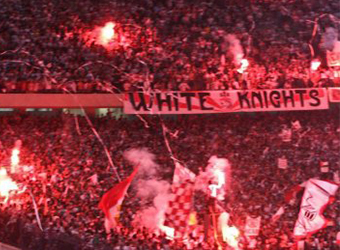A leading member of the Zamalek football fan club Ultras White Knights Sayed Moshagheb was referred by the public prosecution to military prosecution on Sunday in two different criminal cases, his lawyer Osama El-Gohary told Ahram Online.
The first case dates back to May 2013, when the prosecution accused Moshagheb and 16 others of protesting in front of the State Security headquarters in Cairo.
The case initially was not advanced by the prosecution for lack of evidence.
In the second case, which dates back to March 2015, the prosecution accused Moshagheb alongside two others of setting fires at two football stadiums in Cairo and the Grand Conference Hall in Nasr City.
Defence lawyer El-Gohary said:“the crime lab has proven that the fire [at the conference hall] was caused by a short circuit, and the case was closed.”
Moshagheb and the two other defendants in the arson case are also facing charges of establishing the White Nights group, which is committing terrorist actions against the state.
In May 2015, a court of urgent matters banned the various Ultras fan clubs over terrorism concerns.
El-Gohary said that Moshagheb, who has been detained in Aqrab Prison since March 2015, was previously charged in several cases, including the attempted murder of Zamalek Club chairman Mortada Mansour, of which he was acquitted.
El-Gohary said that before today Moshagheb was facing only one case where he and other White Knights members were charged with the murder of 19 Zamalek fans killed during clashes with police in February, 2015.
The upcoming court session for this case is scheduled for 22 February, according to El-Gohary.
“The two cases- that have been transferred to military prosecution- had been closed. I was shocked that they were transferred to military prosecution,” El-Gohary said.
“I think that bringing all these cases against the defendants is to break them,” Gohary further stated.
El-Gohary added: “it is much more difficult to deal with military prosecution than public prosecution, as we will be dealing with officers, but unfortunately the military prosecution has the legal right to look into cases that involve public institutions.”
The Egyptian constitution allows for the trial of civilians in front of military courts in cases that involve attacks on army installations and certain public institutions.
Authorities maintain that military courts conduct fair trials for defendants, who have the right to legal representation and an appeal process.
Source: Ahram online



